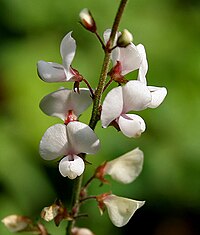
Genetic structure of Alhagi (Hedysareae, Fabaceae) populations using ISSR data in Iran.
Sign Up to like & getrecommendations! Published in 2021 at "Molecular biology reports"
DOI: 10.1007/s11033-021-06511-w
Abstract: Alhagi Gagnebin (Fabaceae: Hedysareae) is a small genus of shrubs or subshrubs distributed in temperate and tropical regions of Asia, Europe, and Africa. The exact number of Alhagi species in Iran has been disputable. Studies… read more here.
Keywords: fabaceae; issr data; hedysareae; structure ... See more keywords

Flavonol triglycosides from Ornithopus compressus L. (Fabaceae)
Sign Up to like & getrecommendations! Published in 2019 at "Industrial Crops and Products"
DOI: 10.1016/j.indcrop.2019.05.048
Abstract: Abstract Five flavonoid glycosides were isolated from the aerial parts of Ornithopus compressus L., yellow serradella (Fabaceae). The structures of the isolated natural products were determined as kaempferol 3-O-(2,6-di-O-β-D-glucopyranosyl)-β-D-galactopyranoside (1), kaempferol 3-O-β-D-glucopyranosyl-(1→6)-[2-O-(2E)-feruloyl-β-glucopyranosyl]-(1→2)-β-D-galactopyranoside (2), quercetin 3-O-(2,6-di-O-β-D-glucopyranosyl)-β-D-galactopyranoside… read more here.
Keywords: fabaceae; ornithopus compressus; glucopyranosyl galactopyranoside; glucopyranosyl ... See more keywords

Nuclear Phylotranscriptomics/Phylogenomics Support Numerous Polyploidization Events and Hypotheses for the Evolution of Rhizobial Nitrogen-Fixing Symbiosis in Fabaceae.
Sign Up to like & getrecommendations! Published in 2021 at "Molecular plant"
DOI: 10.1016/j.molp.2021.02.006
Abstract: Fabaceae, with 765 genera and ∼19,500 species, are the third-largest angiosperm family and important both economically and ecologically, with global crops intensively studied in part for their nitrogen-fixing ability. However, resolution of Fabaceae phylogeny and… read more here.
Keywords: nitrogen; nitrogen fixing; fabaceae; nuclear phylotranscriptomics ... See more keywords

A monograph of Daviesia (Mirbelieae, Faboideae, Fabaceae)
Sign Up to like & getrecommendations! Published in 2017 at "Phytotaxa"
DOI: 10.11646/phytotaxa.300.1.1
Abstract: Daviesia is a clade of scleromorphic shrubs that are endemic to Australia and its near offshore islands, where it is the largest genus of Fabaceae subfam. Faboideae, with 131 species recognised here. The genus is… read more here.
Keywords: faboideae fabaceae; fabaceae; daviesia; daviesia mirbelieae ... See more keywords

Plastid genome evolution in tribe Desmodieae (Fabaceae: Papilionoideae)
Sign Up to like & getrecommendations! Published in 2019 at "PLoS ONE"
DOI: 10.1371/journal.pone.0218743
Abstract: Recent plastid genome (plastome) studies of legumes (family Fabaceae) have shown that this family has undergone multiple atypical plastome evolutions from each of the major clades. The tribe Desmodieae belongs to the Phaseoloids, an important… read more here.
Keywords: fabaceae; evolution; tribe desmodieae; plastid genome ... See more keywords

Pollen Viability and Autogamy Fitness in Bauhinia forficata Link (Fabaceae)
Sign Up to like & getrecommendations! Published in 2018 at "Floresta e Ambiente"
DOI: 10.1590/2179-8087.043316
Abstract: Bauhinia forficata (Fabaceae) occurs in many phytophysiognomies of southern Brazil, however its ecological relevance is not well understood. The present study was developed in the Central Depression of Rio Grande do Sul and aimed to… read more here.
Keywords: viability; bauhinia forficata; pollen viability; fabaceae ... See more keywords

Five Fabaceae Karyotype and Phylogenetic Relationship Analysis Based on Oligo-FISH for 5S rDNA and (AG3T3)3
Sign Up to like & getrecommendations! Published in 2022 at "Genes"
DOI: 10.3390/genes13050768
Abstract: Most Fabaceae have nitrogen fixation abilities and are valuable forage and medicinal resources. However, cytogenetic data of many Fabaceae species are unclear. Karyotypes reveal cytological characteristics and are crucial to understanding the organization and evolution… read more here.
Keywords: oligo fish; karyotype; cytotype arm; arm ratio ... See more keywords